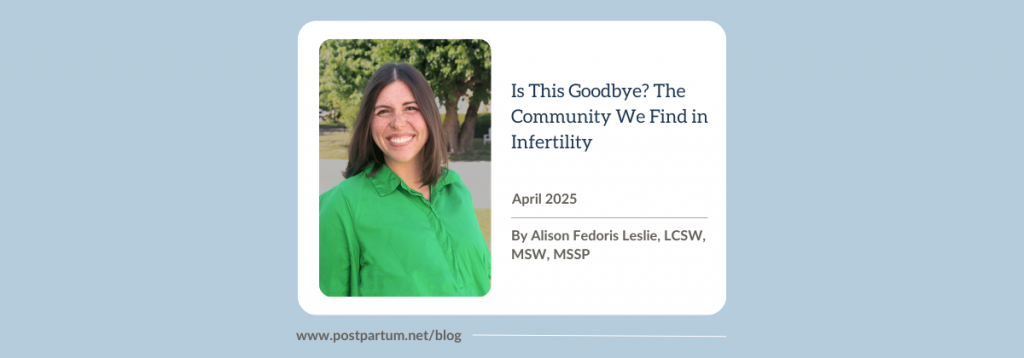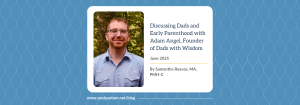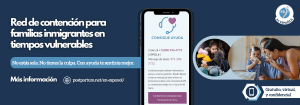By Alison Fedoris Leslie, LCSW, MSW, MSSP
When you are in the midst of infertility, the weight of the unknown is the only constant. You don’t know how long you will be navigating this journey. You don’t know what medical interventions you may or may not need. You don’t know what the impact will be on your body, your relationships, or your partner. You don’t even know if your journey will end with the baby you have so desperately been wishing and hoping for. Yet in my own infertility journey, I began to depend on something that felt in the moment like one of my only respites from the crushing weight of the unknown: the community of people going through the same pain, heartbreak, and tentative hope of trying to conceive.
The TTC (trying to conceive) community is vast and at times overwhelming. Navigating online chat groups as well as more structured support groups can be daunting – there is so much information to share and so many abbreviations to learn. Yet there is something inherently comforting in not having to explain yourself over and over to a community of people who understand the conflicting feelings of the infertility journey. I didn’t have to explain that hearing a friend was newly pregnant brought me anger first and happiness a distant second. I didn’t have to explain that having family members ask how I was doing both brought me comfort as well as feelings of inadequacy and failure. I didn’t have to explain that my partner’s assurances that we could always discontinue treatment if it was “too much” felt like he didn’t believe in my ability to get pregnant and carry a child. No matter where we found ourselves on this journey – from beginning medical interventions to accepting a different path to parenthood – we could actually be ourselves.
Week after week, I joined my support group and felt heard, seen, and appreciated. Yes, this journey was hard and painful and filled with only brief glimmers of hope. Yes, the feelings we “shouldn’t” share or feel were big and hard and complicated. Due to the nature of this journey, it was an “open” group, meaning people could come and go as they saw fit. There is something painful about the unknown or unexpected in that, too. If someone didn’t join for a few weeks, I wondered why. Did their work schedule change? Were they feeling unwell? Or, I both hoped for and felt intense jealousy about, were they finally pregnant? I realized quickly that this group of people, whom I had come to depend on as my confidantes, was potentially, hopefully, a community from which I would eventually depart.
After two and a half excruciating years (which, in many respects, is a short journey in the infertility world), I found out I was pregnant. I was absolutely overjoyed. The invasive exams, daily injections, constant worry, and fear had led to this moment. I felt that I could finally breathe a sigh of relief. Yet in those early moments, I thought about what I was potentially going to lose in my newfound joy: the community that had provided me so much support in the challenging months of fertility treatments. I felt like I was abandoning my friends in battle, their journeys unfinished and forever unknowable to me. I could not come back into that safe space and reveal my good news to them. That space was sacred, meant to be a respite from the gender reveal parties and baby showers of the “outside” world. That space was for the messy, angry, grief-stricken moments. That space was for jealousy and fear and saying the quiet part out loud: “What if I never get to be a parent?”
When you become pregnant after years of infertility, you are now on the “other side.” Yet your experience of infertility never leaves you. It continues to impact your pregnancy and parenting journey, something that is under-discussed as you leave the TTC community. You’ve spent years preparing for this moment, and suddenly it feels like you are alone once again. I found the following reminders helpful as I tried to navigate losing my community and trying to find my place in a new one.
1. Think about how you want to tell your story (and only share as much as you want).
Pregnancy can invite invasive, inappropriate questions for any pregnant person. After navigating infertility (either privately or publicly), it can be overwhelming to have invasive questions or comments about your body and pregnancy journey. When people would joke that I should have planned my pregnancy better in order to avoid late pregnancy in the hot summer months, I felt enraged. I hadn’t had the luxury of “planning” my pregnancy to be at a more temperate time. It took time for me to figure out who I wanted to share that part of my journey with. No one was entitled to know anything about my pregnancy – or my journey to pregnancy. I decided to not share on social media until the end of my pregnancy, and I didn’t have a large baby shower where I would have to field a ton of questions. Figure out what you want to share, and recognize that this can change with your journey as you feel comfortable.
2. You don’t always have to feel grateful.
When you have been so desperate to be pregnant, you may find that you should feel only gratitude, especially when you are thinking about others you’ve met along your journey who are still in a period of waiting. I felt immense guilt when I would feel overwhelmed researching baby items or was just generally tired of being pregnant. I spent my entire pregnancy nauseous and threw up almost daily, and I felt guilty for even feeling sick! How could I feel sick when I knew my group was still meeting, weekly, wishing to be in my place? Pregnancy – and postpartum – can be extremely difficult and isolating in its own way. Recognizing that can be true, even when it is something you and your community have wished for, is necessary for giving yourself the grace to feel what you feel along the journey.
3. You can grieve the loss of this community and know that it will always be here for you.
I will likely try to become pregnant again, and when I do, I will likely face the same challenges in getting pregnant that I did the first time. I will likely find another support group, where I can share in the fear, the worries, and the challenges – albeit with a different experience after having a living child. I have also found that living with infertility has forever shaped who I am and how I experience the world. I do believe that it has allowed me to feel a sense of joy, relief, and gratitude for my son that may have felt different without the years of waiting. It has also contributed to my postpartum anxiety, fear of failure, and unrealistic expectations for motherhood. When I meet others who have been on or are still on their fertility journey, I feel an immediate kinship. We are able to speak in shorthand, whether or not we had the same medical interventions or protocols. We can speak frankly about the difficulties we’ve faced and sit in the messiness of conflicting feelings. We are able to speak about the resilience we have seen in the community we have found along the way. I often find myself thinking of those I met with weekly for so long, and I hope they have found peace wherever they are in their journeys. I grieve the loss of that time together and feel gratitude for the strength they gave me in my own journey. And I sit with the fact that for the most part, their stories will be as unknowable to me as mine is to them.
Infertility can steal your joy. As the years pass and you are still not pregnant, you may begin to dread holidays, birthdays, and occasions that should bring light. You may find yourself avoiding spaces in which you had previously built community in order to protect your own feelings. That is why finding your space in the infertility community–even if it is temporary–is so necessary. There is something profoundly beautiful and sad about the ways we are part of each other’s journeys, if only for a short time. Our paths may be different, but they are forged with resilience, perseverance, and most of all, hope.
Loss & Grief in Pregnancy and Postpartum
Peer Support Groups
Get Help










